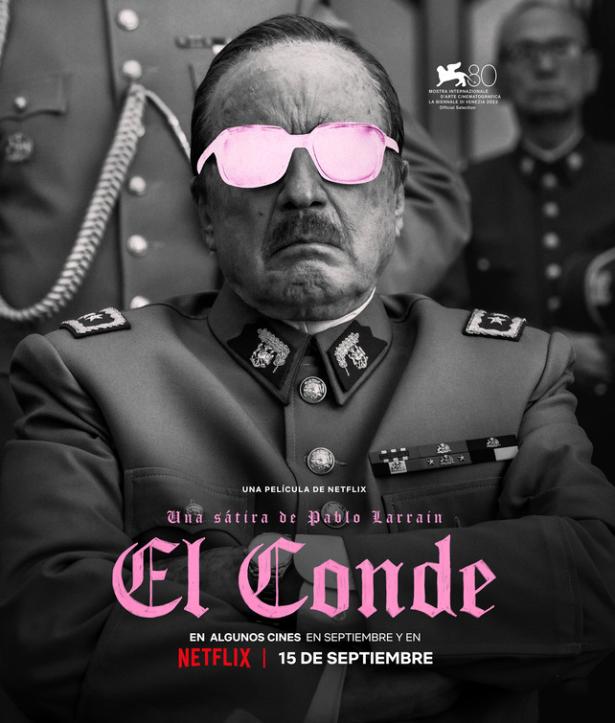A dark, caped figure glides through the night skies above Santiago, Chile — a symbol of eternal portent hovering over the modern city. It slips into office buildings, factories, hospitals, and apartments, and brutally feeds on the lonely inhabitants within. This villain, however, is not a fictional one. He is General Augusto Pinochet, the brutal, U.S.-backed military dictator who ruled Chile from 1973 to 1990 and died in 2006 still with the blood of thousands on his hands. Only in El Conde, Pablo Larraín’s mesmerizing, stomach-turning tragicomic melodrama-horror movie, Pinochet never actually died; he was an immortal vampire and faked his death so that he could avoid prosecution and live out his life in peace on a remote ranch, subsisting on nutritious smoothies made of human hearts and sitting on the vast fortune he amassed during his reign of terror.
That’s not even the craziest element in Larraín’s movie, which is premiering in Venice this week. (The film will then have a limited theatrical release September 8th, before premiering globally on Netflix September 15, just four days after the 50th anniversary of the September 11, 1973 military coup that brought Pinochet to power.) Shot by Edward Lachman in ravishing, Andrei Rublev–esque black-and-white, El Conde surely deserves to be seen on a big screen — but it’s also fun to imagine this piece of agitprop provocation just appearing on the screens of millions of people across the world. It might be the most perverse project Netflix has ever signed off on.
Larraín’s Pinochet is actually a Frenchman born to unknown parents in 18th-century France. Via a brisk, outrageous montage, the director presents the backstory of this beast: Carousing the night and feeding on prostitutes, Claude Pinoche (as he is known then) dedicates himself to the French king. After witnessing the execution of Marie Antoinette, he gives the blood on her guillotine a good lick, absconds with her severed head, and makes off for distant lands, eventually finding himself a rising military star in Chile, in his snide eyes “a land of fatherless peasants” ready for a brutal daddy figure to seize control.
In the film’s present, Pinochet is ancient and doddering (albeit given a snakelike allure by the actor Jaime Vadell), but he still longs for the fresh, rich necks of the young, and he thinks fondly of the days when he feasted on the blood of Imperial France and Britain. Larraín thus suggests a kind of law of the conservation of evil: Like matter, it’s never really destroyed. It transforms and transmogrifies. A wicked brute dedicated to the king and queen of France isn’t vanquished by the Revolution; he merely reinvents himself in other lands. As El Conde proceeds, we understand just how much Larraín has committed to this idea — the film has a couple of late twists that send both its narrative and its politics in delightfully bonkers directions.
The film is also something of a comic family melodrama, believe it or not. Pinochet’s children have converged on his home, worried as they are about the state of their inheritance. Also arriving is Sister Carmen (Paula Luchsinger), a beautiful young nun with a head for numbers, there to calculate the extent of Pinochet’s riches. Carmen also happens to be an exorcist, but her exorcisms are as much financial as they are spiritual. With a seductive, disarming smile, she interrogates the whole Pinochet family and gets them to reveal all their many misdeeds and petty grievances.
The idea of a politician as a vampire isn’t new. In his 2008 film Il Divo, Paolo Sorrentino portrayed the controversial Italian politician Giulio Andreotti also as a kind of vampire, a silent, ageless figure living in a world of elegant shadows. Larraín goes much further. He embraces genre, and he embraces gore. The blood is everywhere — collecting on floors, leaving thick streaks, dripping down cheeks and chins. The film’s finale is practically a miasma of beheadings. The director doesn’t play coy with any of this stuff. He’s not afraid to find beauty and thrills in this monstrous story he’s concocted about the people who raped his country, because he knows that he has to seize our attention and keep it.
In recent years, Larraín’s profile has risen thanks to his star-driven portraits of women such as Jacqueline Kennedy Onassis (Jackie) and Lady Diana (Spencer). El Conde would, at first, seem like a radical departure from that type of subject matter and a return to fanciful, genre-inflected political portraits such as Neruda. But in truth, it’s all part of the same continuum. Jackie and Spencer might not seem like overtly political films, but they’re testaments to the fact that the closer one gets to the centers of power, the more sublimated that power becomes, the more embedded in ritual, morality, and behavior. The so-called western democracies of the U.S. and the U.K. are calm, hermetically sealed worlds. It’s in the far edges of empire that the real carnage happens, and El Conde presents Chile as a land distant and alien to both Pinochet and the forces that literally spawned him, making it an anonymous feeding ground for the ravages of unchecked capitalism and kleptocracy. Beneath all the genre theatrics, what comes through most vividly in El Conde are Larraín’s sadness and rage at what happened to his country. Anyway, it’ll be on Netflix in a couple of weeks. Enjoy.
El Conde will have a limited theatrical release September 8th, before premiering globally on Netflix September 15, just four days after the 50th anniversary of the September 11, 1973 military coup that brought Pinochet to power.


Spread the word